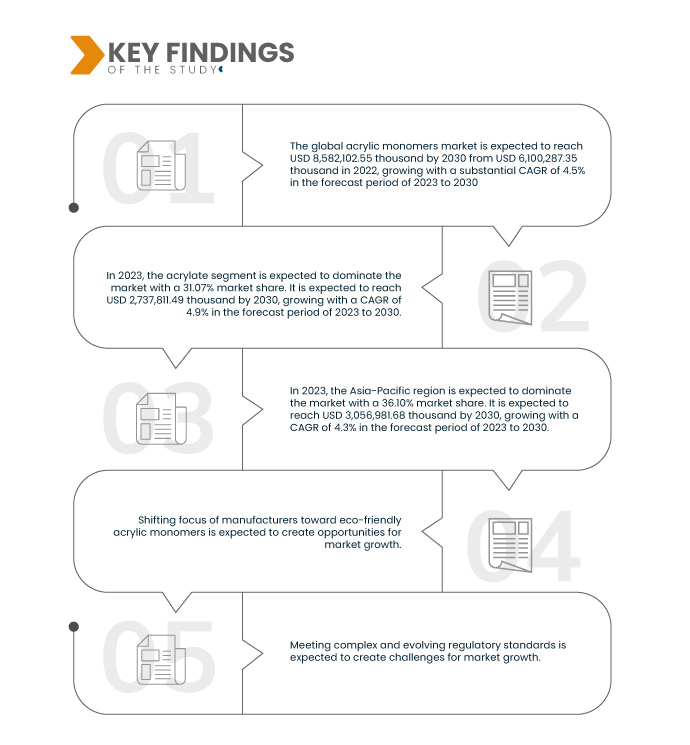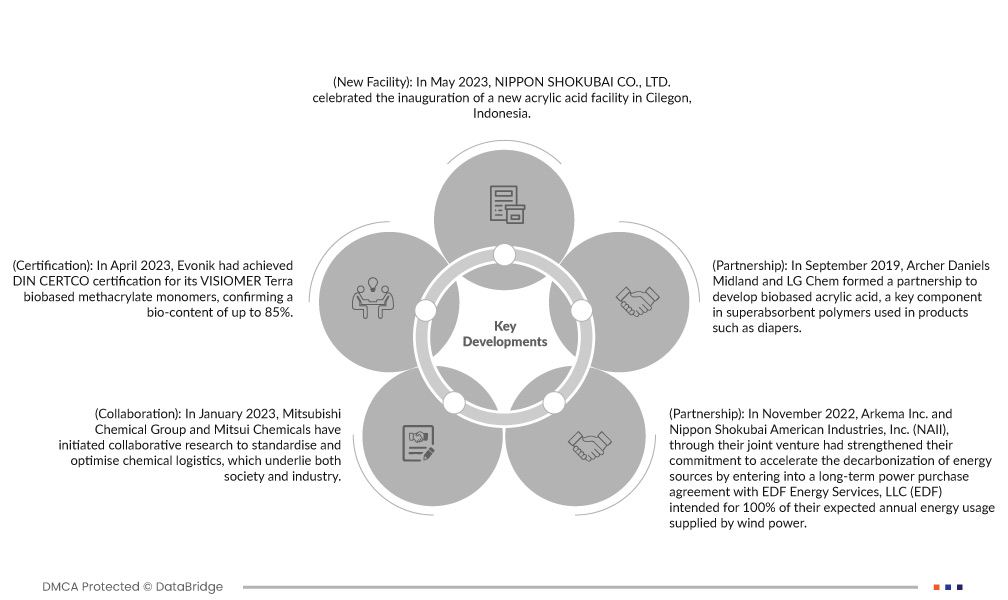Индустрия красок и покрытий позитивно смотрит на рынок акриловых мономеров, что обусловлено различными факторами и сферами применения, которые способствуют его росту. Одним из основных факторов, обуславливающих позитивные перспективы индустрии красок и покрытий, является широкое использование акриловых мономеров, в частности N-бутилакрилата. Эти мономеры служат важными строительными блоками для сополимеров, используемых в рецептурах красок и покрытий. Эти свойства включают способность образовывать гидрофобные полимеры, которые имеют решающее значение для создания покрытий, обеспечивающих защиту и долговечность. Это свойство делает их особенно ценными при создании покрытий, где водостойкость и долговечность имеют важное значение. Метакрилат, еще один важный акриловый мономер, полученный изметакриловая кислота, широко используется в различных приложениях, включая компьютерные экраны и краски.
Доступ к полному отчету @https://www.databridgemarketresearch.com/reports/global-acrylic-monomers-market
Исследование рынка Data Bridge показывает, что Мировой рынок акриловых мономеров ожидается, что к 2030 году она достигнет 8 582 102,55 тысяч долларов США с 6 100 287,35 тысяч долларов США в 2022 году, а среднегодовой темп роста составит 4,5% в прогнозируемый период с 2023 по 2030 год.
Ключевые результаты исследования
Увеличение расходов в строительном секторе
Строительный сектор выступает жизненно важной опорой экономического развития, формируя облик городов и закладывая основу для роста инфраструктуры. Рост расходов на строительство в первую очередь объясняется растущей урбанизацией и ростом населения. Растет спрос на жилищное, коммерческое развитие и развитие инфраструктуры, поскольку все больше людей переезжают в города. Правительства и частные инвесторы вкладывают значительные средства в строительные проекты, чтобы удовлетворить эти потребности. Этот всплеск строительной активности стимулирует рынок акрилового мономера.
Объем отчета и сегментация рынка
|
Отчет по метрике
|
Подробности
|
|
Прогнозный период
|
2023–2030 гг.
|
|
Базисный год
|
2022 год
|
|
Исторический год
|
2021 г. (настраиваемый 2015–2020 гг.)
|
|
Количественные единицы
|
Выручка в тысячах долларов США, объем в тысячах литров
|
|
Охваченные сегменты
|
Продукт (Акрилат, Акриловые кислотыи соли, бисфенольные акриловые смолы, полифункциональные акриловые смолы, фторированные акриловые смолы, Акрилонитрил, акриламид и метакриламид, малемид, углеводные мономеры и другие), применение (пластик, клеи и герметики, синтетические смолы, акриловые волокна, строительные материалы, ткани, акриловая резина и другие), конечное использование (краски и покрытия, строительство и строительство). , автомобилестроение, потребительские товары, упаковка, очистка воды, морская промышленность, аэрокосмическая промышленность и другие)
|
|
Охваченные страны
|
Китай, Индия, Япония, Южная Корея, Австралия и Новая Зеландия, Малайзия, Сингапур, Таиланд, Индонезия, Филиппины, остальные страны Азиатско-Тихоокеанского региона, Германия, Великобритания, Италия, Франция, Испания, Швейцария, Россия, Турция, Бельгия, Нидерланды, Остальная Европа, США, Канада, Мексика, Южная Африка, Саудовская Аравия, Объединенные Арабские Эмираты, Египет, Израиль, остальные страны Ближнего Востока и Африки, Бразилия, Аргентина и остальная часть Южной Америки.
|
|
Охваченные игроки рынка
|
BASF SE (Германия), Arkema (Франция), Dow (США), Mitsubishi Chemical Group Corporation (Япония), Evonik Industries AG (Германия), B JOSHI AGROCHEM PHARMA (Индия), Bharat Petroleum Corporation Limited (Индия), Chirag Enterprise ( Индия), DHALOP CHEMICALS (Индия), LG Chem (Южная Корея), LobaChemie Pvt. Ltd. (Индия), NIPPON SHOKUBAI CO., LTD. (Япония), Pallav Chemicals (Индия), Solventis (Великобритания) и Tokyo Chemical Industry Co., Ltd. (Япония) и других.
|
|
Точки данных, включенные в отчет
|
В дополнение к информации о рыночных сценариях, таких как рыночная стоимость, темпы роста, сегментация, географический охват и основные игроки, рыночные отчеты, подготовленные Data Bridge Market Research, также включают углубленный экспертный анализ, географически представленное производство по компаниям и мощность, схема сети дистрибьюторов и партнеров, подробный и обновленный анализ ценовых тенденций и анализ дефицита цепочки поставок и спроса.
|
Сегментный анализ
Мировой рынок акриловых мономеров разделен на три заметных сегмента в зависимости от продукта, применения и конечного использования.
- В зависимости от выпускаемой продукции рынок подразделяется на Акриламид а также метакриламид, акрилат, акриловые кислоты и соли, акрилонитрил, бисфенолакрилаты, углеводные мономеры, фторированные акрилаты, малемид, полифункциональные акрилаты и другие.
В 2023 году акрилат Ожидается, что этот сегмент продукции будет доминировать на мировом рынке акриловых мономеров.
Ожидается, что в 2023 году сегмент акрилата будет доминировать на рынке с долей рынка 31,07% благодаря растущей отрасли красок и покрытий.
- В зависимости от применения рынок подразделяется на пластиковые, Клеи и герметики, синтетические смолы, акриловые волокна, строительные материалы, ткани, акриловая резина и другие.
В 2023 году пластик Ожидается, что этот сегмент применения будет доминировать на мировом рынке акриловых мономеров.
Ожидается, что в 2023 году сегмент пластика будет доминировать на рынке с долей рынка 29,30%. потому что быстрая урбанизация стимулирует спрос на продукты на акриловой основе в архитектурных и декоративных покрытиях.
- В зависимости от конечного использования рынок подразделяется накраски и покрытия, строительство, автомобилестроение, потребительские товары, упаковка, очистка воды, морская промышленность, аэрокосмическая промышленность и другие. Ожидается, что в 2023 году сегмент красок и покрытий будет доминировать на рынке с долей рынка 30,68%.
Основные игроки
Data Bridge Market Research анализирует BASF SE (Германия), Arkema (Франция), Dow (США), Mitsubishi Chemical Group Corporation (Япония) и Evonik Industries AG (Германия) как основных игроков, работающих на мировом рынке акриловых мономеров.
Развитие рынка
- В мае 2023 года компания NIPPON SHOKUBAI CO., LTD. отпраздновала открытие нового завода по производству акриловой кислоты в Силегоне, Индонезия. Это современное предприятие имеет производственную мощность 100 000 тонн в год, что укрепляет позиции Nippon Shokubai как крупного игрока на рынке акрилового мономера.
- В апреле 2023 года компания Evonik получила сертификат DIN CERTCO для своих метакрилатных мономеров VISIOMER Terra биологического происхождения, подтвердив биосодержание до 85%. Эта сертификация, основанная на радиоуглеродном методе C14 и протоколе ASTM D 6866:2021, подчеркивает приверженность Evonik принципам устойчивого развития и смягчения последствий изменения климата.
- В январе 2023 года Mitsubishi Chemical Group и Mitsui Chemicals начали совместные исследования по стандартизации и оптимизации химической логистики, которая лежит в основе как общества, так и промышленности. Корпорации хотят постепенно развернуть деятельность по ряду ключевых тем, причем те, которые могут быть реализованы немедленно, как ожидается, начнутся в этом финансовом году. Mitsubishi Chemical Group и Mitsui Chemicals будут работать вместе над развитием более эффективной и устойчивой логистики химической продукции.
- В ноябре 2022 года Arkema Inc. и Nippon Shokubai American Industries, Inc. (NAII) через свое совместное предприятие укрепили свои обязательства по ускорению декарбонизации источников энергии, заключив долгосрочное соглашение о покупке электроэнергии с EDF Energy Services, LLC. (EDF) рассчитаны на 100% ожидаемого годового потребления энергии за счет энергии ветра.
- В сентябре 2019 года Archer Daniels Midland и LG Chem заключили партнерство для разработки акриловой кислоты биологического происхождения, ключевого компонента суперабсорбирующих полимеров, используемых в таких продуктах, как подгузники. Эти совместные усилия направлены на создание устойчивых альтернатив используемой в настоящее время акриловой кислоте нефтехимического происхождения.
Региональный анализ
Географически в отчет о мировом рынке акриловых мономеров включены следующие страны: Китай, Индия, Япония, Южная Корея, Австралия и Новая Зеландия, Малайзия, Сингапур, Таиланд, Индонезия, Филиппины, остальные страны Азиатско-Тихоокеанского региона, Германия, Великобритания, Италия, Франция. , Испания, Швейцария, Россия, Турция, Бельгия, Нидерланды, Остальная Европа, США, Канада, Мексика, Южная Африка, Саудовская Аравия, Объединенные Арабские Эмираты, Египет, Израиль, Остальные страны Ближнего Востока и Африки, Бразилия, Аргентина и остальные страны. Южной Америки
Согласно анализу исследования рынка Data Bridge:
Азиатско-Тихоокеанский регион является доминирующим регионом в Мировой рынок акриловых мономеров
Ожидается, что Азиатско-Тихоокеанский регион будет доминировать на мировом рынке акриловых мономеров из-за растущей промышленности красок и покрытий в регионе.
Северная Америка оценивается как самый быстрорастущий регион на мировом рынке акриловых мономеров.
Ожидается, что Северная Америка будет расти в течение прогнозируемого периода с 2023 по 2030 год из-за роста расходов на строительный сектор в регионе. В дополнение к этому, различные технологические достижения в технологиях производства и расширение производственных мощностей в регионе.
Для получения более подробной информации об отчете о мировом рынке акриловых мономеров нажмите здесь –https://www.databridgemarketresearch.com/reports/global-acrylic-monomers-market














